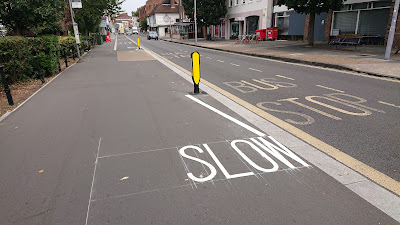With parts of the world going up in flames as a result of the
unprecedented heatwave caused by climate
change, stoked by the burning of fossil fuels, it may seem churlish to raise the
matter of cycling issues again, as we all speed ever onward – by road and by
air - towards Hell.
But hey, why not?
Especially as the National Highways has been accused of
“systemic failure” on cycling provision, as revealed in freedom of information
requests.
Admittedly, this is small beer compared to government
failings to follow through its policies to tackle global warming but it’s all
connected. Improving road safety for cycling is one way to reduce car
dependency, and so reduce pollution.
It’s not only the Conservatives wavering on imposing schemes to reduce traffic, but Labour, too, and all because they fear losing votes at the ballot box. This would seem to fly in the face of reports saying the public will back action to slow down climate change.
Nevertheless, government fears a driver backlash from people
who don’t want to stop driving.
The question to put to them is will they become cannibals and
start eating each other once the heatwave eventually causes crop failure.
Anyway, before we all start tucking in to our neighbours, here
is the latest revelations on government incompetence re: cycling safety.
According to a report in The Guardian (28 July) by Laura
Laker, National Highways has spent £84m on 160 cycling and walking projects
since 2015, “but has stated via written questions and Fol requests that it is unable to say exactly what it spent the
money on, or the impact of the investment on cycle use and safety”.
 |
| Dangerous cycle lane through a bus stop in Kingston, Surrey. |
We’ve known for years how government has failed to provide
the £billions necessary to meet their own targets of a 50 per cent increase in
cycling and walking.
According to transport consultant Phil Jones, co-author of
the National Highways own cycle traffic design standards (CD195), the
government is “failing to meet the needs of the main active travel user
(cyclists) in rural areas.”
That’s the killer
here, the Department for Transport has an excellent design guide, which is
largely ignored by traffic planners and they are allowed to get away it.
Jones accuses National Highways of a “systemic failure” to
apply its own standards and says he knows from his own experience this is
leading to poor provision.
Such as creating shared use facilities on pavements with
walkers in built up areas where they were never intended to be because of
possible conflict at busy times of day.
And what’s more, the government know this. Worse, they have
actively conspired to allow authorities to sidestep the official design
guidelines and lay down substandard, often dangerous cycle lanes.
It appears that transport planners are using a loophole in
the National Highways own design guidelines which can result in poor cycle
infrastructure.
I know for a fact that Surrey Highways who have produced
some spectacularly bad cycle infrastructure claim that the Department for
Transport allowed for sub-standard – or less than perfect as they preferred to
say - works if planners were unable to follow the guidelines!
Unable translates to either being unwilling to pay for or
unable to afford to do a half-decent job.
To back up my findings, the article quotes a minister for
transport, Richard Holden MP, admitting that it was not always applying CD195
on rural roads!
One of the biggest issues facing cyclists are the inadequate
crossing points on A-roads and motorways which make cycling perilous. It has
been like this for nigh on 80 years, since dual carriageways were first built
with cycle lanes down either side of them lacking rights of way at side roads
and no provision at major junctions or roundabouts.
Allez.

.jpg)

